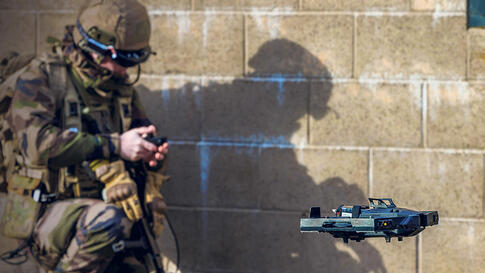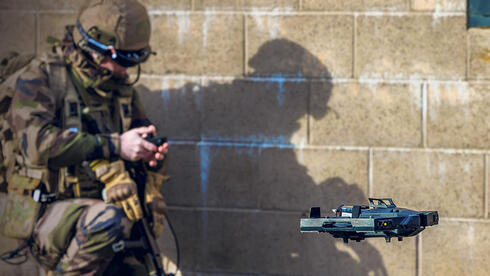
The biggest global VCs are secretly battling over Israeli defense-tech startups
The vision is becoming reality: reservists returning from the battlefield are establishing defense tech startups, and unlike in the past, the VC industry is rising to the occasion. Global venture capital leaders have arrived in Israel, closing a series of under-the-radar investment rounds. The hot name: Kela, which just completed a Seed round with Sequoia and has already secured a commitment for another round of funding from Lux.
"The current war has revealed that Hezbollah is akin to the 'Ukrainians' in this campaign. They are the ones who think more creatively and not linearly, while the IDF tends to focus on mega projects and overlooks small details. For instance, with just one anti-tank missile, Hezbollah neutralized the 'Sky Dew' observation balloon, a project with immense capabilities that had significant budgets invested in it," says Lior Handelsman, a partner at the venture capital fund Grove Ventures and a lieutenant colonel in Unit 81, the IDF’s technological unit within the Intelligence Corps, in an interview with Calcalist.
Since October 7, Handelsman has been on extended reserve duty in the unit, which even led to a promotion. Recently, he has scaled back to a few reserve days a month. Handelsman, one of the legendary five founders of SolarEdge, a significant success story from Unit 81, expresses cautious optimism. Despite the ongoing crisis, one in a series of crises over the past year, a new industry is emerging in Israel, drawing attention from international investors who come to explore start-ups of a completely new kind, even amidst threats from Hezbollah and Iran.
These start-ups belong to the new-old category known as Defense Tech, focusing on military technologies. With the outbreak of the current war and the widespread mobilization of reservists, discussions began about the many projects that would emerge after these reservists returned from the battlefield. This is now coming to fruition. In the past few weeks, several quiet investment rounds have closed, bringing some of the biggest names in global venture capital to Israel. These companies, founded after October 7, are not led by the typical Unit 8200 graduates but rather by combat unit veterans who have firsthand experience, such as members of Egoz and other elite units.
The most notable example is Kela, a company founded by Alon Dror and Hamutal Meridor, both graduates of the IDF's Talpiot program. Meridor, who was until recently a partner at the Vintage venture capital fund and previously managed Palantir's Israeli operations, helped Kela secure its first Seed funding from the prestigious American fund Sequoia. Sequoia even outmaneuvered other funds interested in investing, effectively "taking over" the round. Calcalist learned that before the money from this round even entered the bank, Kela received a commitment for a second fundraising round from the American venture capital fund Lux, which has recently become active in Israel. Lux, which manages $5 billion, specializes in deep technologies and identified the niche of military technologies in Israel. Alongside Kela, Lux has already invested in another Israeli start-up.
Another start-up, Oz, still in stealth mode, has raised its first round to develop a solution to prevent friendly fire, one of the IDF's most significant challenges, particularly in the early days of the war when nearly a fifth of the casualties were due to friendly fire. Oz was founded by reservists who returned from extended service with ideas on how to solve this problem. It is rumored that the technology draws from gaming worlds, such as laser tag, which "marks" targets by sending signals indicating whether they are friend or foe. Another stealth start-up, whose name is not yet disclosed, also bases its solutions on gaming technologies aimed at simulating combined combat between different military forces, as is often required in the current conflict. In reality, the possibilities for such training are very limited.
These companies join established start-ups in the field, such as Xtend, Smart Shooter, and Exodigo. Xtend, which develops a robotic operating system for drones, has since October 7 shifted its focus entirely to the military sector and supplies to the IDF. After foreign armies also expressed interest, the company completed a $40 million fundraising round last May. Exodigo, which raised $75 million in February to accelerate the development of its underground mapping systems, faced challenges as 60 of its employees were called up for reserve duty after the outbreak of the war. Amit Shahar, one of its employees serving as a reservist in a combat engineering unit, was killed. Smart Shooter, which developed and manufactures smart sights for weapons, counts among its investors Nitsan Alon, a member of the negotiation team for the return of abductees and a company director.
Related articles:
"Everything is happening at an accelerated pace"
The new ecosystem is vibrant, and according to Startup Nation Central (SNC), there are currently 160 companies operating in Israel in the defense sector. However, the list does not yet include the new companies that have sprung up in recent months. "Now everything here is happening at an accelerated pace. In the last two months, I have seen over 20 start-ups in the defense fields," says Handelsman. "I've even seen soldiers using smartphones with noise detection apps to warn earlier about drone entry. Many high-tech companies have received product specifications and development requests from employees serving in the reserves, and quickly sent back functional software," Handelsman describes some of the initiatives growing at the intersection of the IDF and the high-tech industry, directly from the field.
"People are working on everything, from advanced intelligence gathering systems to new and lethal anti-aircraft missiles. There are also many sensors, communication systems, command and control solutions, systems for identifying aircraft or unmanned vessels using non-radar technologies, and of course, autonomous drones for neutralizing targets and gathering intelligence," he explains the diverse activities of the flood of new start-ups.
Alon Kantor, a new partner at the 10D fund and one of the first investors in Exodigo, is also surprised by the quantity and quality of military start-ups he encounters. Kantor, who served for many years in senior positions at Check Point, founded Toka, a cyber start-up, and a month ago joined the venture capital fund to build a portfolio in the military field. He too has seen dozens of presentations on the subject in recent months: "We feel the explosion in the military field on the ground, and we see new companies every day," he tells Calcalist. "Most of the companies I've met deal with hardware, a lot of it related to drones: anti-drones, drone brains, etc. For the first time, these entrepreneurs are not seeking funding from government bodies or giant companies in the field, but are building the companies as start-ups and preparing presentations for venture capital," Kantor says, highlighting the significant transformation happening not only in Israel but globally. This transformation fits into a major trend led not only by the U.S. but also by NATO.
Both Handelsman and Kantor point to the trend of venture capital funds coming to Israel in search of these start-ups, strategically identified by the military market as a new and promising activity even before the outbreak of war in Israel, following the Russian invasion of Ukraine in 2022. This has sharpened the need for rapid developments in the military market and led to a dramatic increase in defense budgets worldwide. As a result, in recent months, despite the complex security situation in Israel, delegations from major U.S. funds, including General Catalyst and Andreessen Horowitz, have visited, with Andreessen Horowitz recently announcing a policy called "American Dynamism," which practically means investing in start-ups in the military and space fields. The venture capital industry understands that these funds' growing involvement in Israel is tied to this trend. Representatives from the Lux fund have also visited Israel and have made two investments here since.
In both cases, these are strategic players of great importance, as both funds are among the few investors with access to participate in the most significant fundraisings in the field. This includes the American company Anduril, which made history last week by raising $1.5 billion at a $14 billion valuation. Anduril's fundraising is now considered a defining event in the industry, marking the final stamp of approval for venture capital funds to fully enter a niche they had previously avoided.
The boom in military technologies comes after the wars between Russia and Ukraine and Israel's conflict in Gaza exposed the slowness and clumsiness of traditional large armies and highlighted the importance of quick response and adoption of affordable, targeted technologies. Drones and UAVs are the biggest and most complex challenges Israel is currently facing, but many other aspects are not being addressed. These two major wars, ongoing since 2022, have revealed the flaw in relying solely on large-scale, hermetic solutions, as they are often approved more easily than smaller, more agile projects. This creates absurd situations where simpler, more accessible technologies are used effectively by guerrilla organizations, while regular armies struggle to deploy more expensive and complex military drones that are difficult to train soldiers on quickly.
A new category that could rival cyber
The operational need exists, unfortunately, and for the first time, venture capital funds seem genuinely willing to invest in start-ups in this field. However, there is still a long way to go, with many challenges remaining before the tech industry can fully engage with government bodies. For now, the figures are not particularly encouraging. In the first half of 2024, defense sector companies raised only $228 million, compared to $600 million during the same period in 2023, according to Crunchbase. Although the second half started with a bang thanks to Anduril's massive fundraising, it's too early to say whether other big fundraisings will follow.
The first and most persistent obstacle for the venture capital industry is the long development times required for military products, followed by lengthy processes to compete in tenders for military and government contracts, which the venture capital industry is not typically equipped to handle. The second problem appears to have a solution, as armies now realize they have been left behind and are eager to catch up. Back in 2015, the Pentagon established an innovation unit specifically to integrate technological solutions from start-ups into its systems, both through funding and providing access to tenders. An example of this is the long-established Israeli company Cellebrite, which recently received funding from this Pentagon unit to develop a product to identify, map, and expose Hamas terrorists operating in the tunnels under the Gaza Strip.
These elements, in addition to operational needs, are pushing Israeli start-ups into military technologies, in what appears to be a new-old trend. However, there's still a long way to go before the term Defense Tech becomes as recognized as Fintech or Cyber, the big hit from previous crises in the high-tech industry. According to Handelsman, "There is a rare opportunity here to expand Defense Tech to a category that could rival Cyber in terms of investment. The challenge is to create a category that is not fully dependent on military funding, to build companies that have dual-use, so they can continue to survive even during calm periods. The cyber field emerged from a big crisis in high-tech in 2001, and today it generates huge investments. The same thing could happen with Defense Tech," he concludes.
